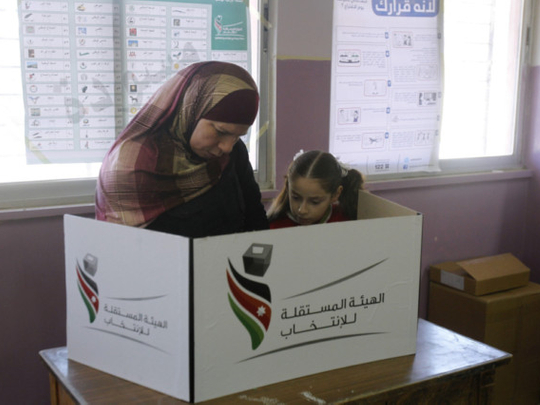
Amman: Jordanians on Wednesday voted in a parliamentary poll snubbed by Islamists who have staged strident pro-reform protests and have already slammed as illegitimate what is expected to be an opposition-free body.
The Independent Election Commission announced a turnout of 31.8 percent of the registered electorate of 2.3 million eight hours after polling stations opened at 0400 GMT.
"The nation will not come to a halt at the request of this party or that group," Prime Minister Abdullah Nsur told a news conference, referring to the Muslim Brotherhood.
He dismissed claims that Jordanians were not turning out in numbers to vote after the powerful Islamist group boycotted the election.
"If people do not want to vote, it is because they were not convinced of the performance of past parliaments or electoral integrity," he said.
A total of 1,425 candidates, including around 140 former MPs and 191 women, are contesting 150 seats in parliament's lower house.
After voting in his home town of Salt northwest of Amman, Nsur insisted that "this time, the elections are clean."
"After the elections, I will submit my resignation to his majesty the king. It is up to him to decide," the premier said.
Rented cars in Amman and other cities ferried voters to polling stations, where supporters of the candidates gathered hoping to sway the undecided, offering them coffee and sweets before and after casting their ballots.
"We respect all political parties and their views. But this is a democratic march, and boycotting is not a solution," Foreign Minister Nasser Judeh told AFP.
Pick-up trucks plastered with posters of the candidates roamed Amman's busy streets as people queued outside polling stations.
"Elections day is here... A beautiful day for a better tomorrow. Proud of those who made their voices heard!" Queen Rania, wife of King Abdullah II, wrote on Twitter.
Police said supporters of two candidates in east Amman briefly exchanged gunfire but no one was hurt, as minor clashes were also reported in the southern city of Karak.
"We need a parliament that will solve our problems, improve our lives and fight the corruption plaguing the country," Rima Hattar, a 32-year-old schoolteacher, said after voting in the Christian city of Fuheis, near Amman.
The Islamists and the National Reform Front of former premier and intelligence chief Ahmad Obeidat are boycotting the polls, arguing that there is no real will to reform.
"The coming parliament will be short-lived because it will not have any political weight," deputy Brotherhood leader Zaki Bani Rsheid told AFP after polling began.
"Our boycott was the right decision because a parliament or government that is imposed on people is illegitimate."
The Arab Spring that began two years ago and toppled four regimes across the region also sparked regular protests in Jordan, where a combination of youths and Islamists have been demanding sweeping political and economic reforms.
Their protests have become increasingly vocal and, in a deadly November rioting over a sharp hike in fuel prices, there were unprecedented calls for King Abdullah II to step down.
The monarch, whose position is not thought to be under serious threat, is hoping the election will produce a new crop of strong MPs who can jump-start reform.
But analysts say tribal leaders, other pro-regime figures and independent businessmen are set to sweep the polls in the country of 6.8 million people.
The vote "will add to problems instead of solving them, particularly under the boycott. We will see a parliament that does not have political weight," analyst Oraib Rintawi of the Al-Quds Centre for Political Studies told AFP.
The king has said he plans for the first time to consult MPs before naming a premier, insisting that strong political parties are needed to help pave the way for parliamentary government.
Islamists also object to existing constituency boundaries which they say over-represent loyalist rural areas at the expense of Islamist urban bastions.
bur-akh/srm
AFP












